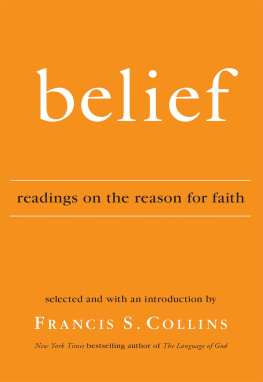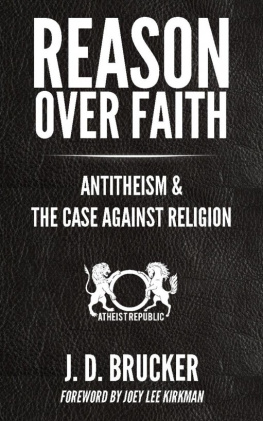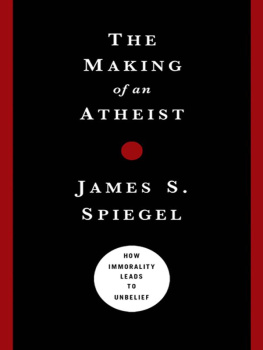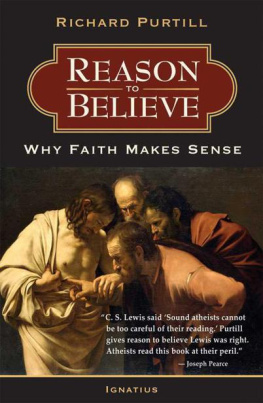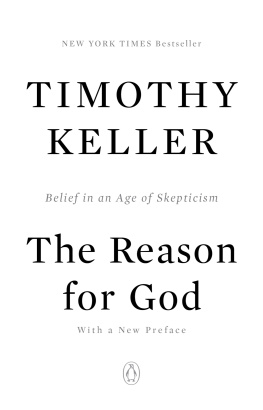1

Wouldn't It Be Nice?
An old friend who I hadnt seen since high school recently popped up on Facebook. I smiled as I saw his photos and noticed a little less hair and a little more weight, but his quirky smile was still the same. As I read his information profile, I remembered how cynical he could be. In describing his political affiliation, he wrote, Nothing changes anyway... I laughed. Then I read his entry under religious views: Wouldnt that be nice?
Now I am no expert on Facebook entries. I understand that Mike was probably just trying to breeze through a bunch of profile questions with a touch of wit, but this caption caught me off guard. I pondered that question for a little while. What an interesting question.
Of course the question is really no question at all; it is nothing more than a curt way to express his skepticism. What he means is, Its a shame faith isnt real. If I could guess at what he was thinking, he would probably say that Santa Claus, the Easter Bunny, the Tooth Fairy and Tinkerbell are all nice ideas, but they are only thatideas, feelings, sentiments. So, for my friend, God falls into this category as well. Wouldnt it be nice if it were all true? The question is actually a statement. Faith is a nice idea, for the delusional.
If he had entered Atheist or I dont have any religious beliefs, I dont think I would have taken as much notice. There is something about Wouldnt it be nice? that annoyed me. There is something so defeatist about it. Just because it is a beautiful idea does not make it a fairy tale. As if to say that having one ultimate source of knowledge and purpose that is just too good to be true is what makes it ultimately false. Wouldnt it be nice if all of this we see around us had purpose, that this crazy world is not adrift in meaninglessness, and that at the end of the day there is Someone who stays awake and looks over us, cares for us and loves us.
It would be nice, actually.
It would be nice if we werent alone on this small planet in the midst of seemingly infinite blackness, because as humans we long for relationship. It would be nice if someone had a plan for our lives, because living merely for ourselves is an empty pursuit. It would be nice to know someone is rooting for us, someone who knew us in the most intimate way and still approved. It would be nice to have someone we could ask for help, confidence, mercy, grace. It would be nice to have the help and guidance of someone beyond our finite humanity, because there are some things that we just cant accomplish on our own.
I am increasingly troubled by the growing distrust of the very things we would love to see. It is tragic that people could potentially miss out on something as rich as a relationship with their Creator or the warmth of forgiveness and acceptance of their God just because it seems too good to be true. Isnt it strange that just because something happens to agree with our deepest longings, we assume it cant be real? Wouldnt the opposite be just as true: Since there is a worldwide ancient desire for something Other, there must be something to it?
Now traditionally Christians have taken issue with the likes of my friend and developed impressive arguments to prove their faith. These arguments are used to debate skeptics and somehow convince them that faith has a rational foundation. Though research has uncovered some interesting facts about the reliability of the Bible and the historical record of Christianity, these debates rarely do anything more than solidify the positions of either side. To be honest, I dont think we even need to engage in a debate. What if there were no argument for God?
Imagine agreeing with the Wouldnt it be nice people: You are right, there are a lot of elements of Christianity that just seem absurd.
But is there room for conversation after saying this?
I dont mean to say Christian faith is untrue. Lets face it, if there is no Godthat is, there is no purpose to anything and religion is a fairy talewould we have discovered it? Is it possible to discover something that doesnt exist? C. S. Lewis put it succinctly, If the whole universe has no So I am not encouraging us to side with atheists and give up on faith. Faith has had traction with humanity for millennia and with great purpose. No, I am not saying that faith is untrue, just unreasonable.
Perhaps it is not so much un- reasonable as it is beyond reasonable. No doubt you have heard the sometimes overused analogy of ants. In this analogy, imagine you have an ant farm and have become so delighted with the ants that you want to communicate with them. Repeated attempts to talk to them through the glass gets you nowhere; they just keep tunneling through dirt doing their ant thing. You try tapping on the glass. No good; imagine a huge finger from the sky about three miles wide apparently smashing the atmosphere on a cloudless day. Ant panic.
Now assume you are able to talk with one of them using some sort of translator device. Even then, everything you say would be ridiculous. Imagine trying to share your life with an ant. Your daily life of cars, iPods and blenders would be nonsense to an ant. Everything would have to be mediated by some sort of story or symbol that would help the ant grasp what you are talking about. In a world of find food , build dwelling , make more ants , how would an ant grasp your favorite song or your typical day?
In the same way, when we talk about things (like God) that are outside the experience of our current existence, we can say that they are (in the most literal way) nonsense , that is, beyond the domain of the senses. So when we talk about the possibility of God and what that means for us, we have to take absurdity and nonsense as starting points. We must do so especially as we speak of the Christian faith, because God decided to reveal himself to us through the person of Jesus. If we take seriously that Jesus was from a completely different existence, the things that he spoke of were beyond our world of five senses. As such they break traditional rules of logic; in fact, they must in order to be authentic. There truly is no argument for God that is capable of bearing the weight of his existence. Things that operate within the realm of human reason bear the fingerprints of human inventors. The stuff of God, however, doesnt just sound strange, it is strange.
Lets pause here for a second. Chances are you have never been encouraged by someone who believes in God to see that faith is absurd. I have had several friends who wanted me to see faith as nonsense and give it up. I have resisted them and usually tried to give reasons for belief. Indeed, Christianity does have logically convincing ideas that can lead someone to belief, and well discuss some of these toward the end of the book. More recently, however, I have wondered why one has to necessarily lead to the other. Why does the fact that faith is hard to accept logically become the end of the argument rather than the beginning of something different? In fact, maybe the more we let go of our secure grip on what makes sense, the more vibrant our faith will become.
* * *
Think for just a moment how absurd faith really is.
The Bible opens with Goda superhuman, fatherly type who at some point before time spoke everything into existence. With no tools, no material, no floor, no ceiling, from somewhere beyond everything we know, he simply said Let there be and it was so. This is hard to even imagine. How does someone create with no materials? Where was God standing when there was nothing? The Bible says that God was hovering over the surface of the waters as he spoke things into existence. What water? Do we take literally that God has wings? Or a mouth to speak with? Even if we take it figuratively, where did God come from when he decided to create?




